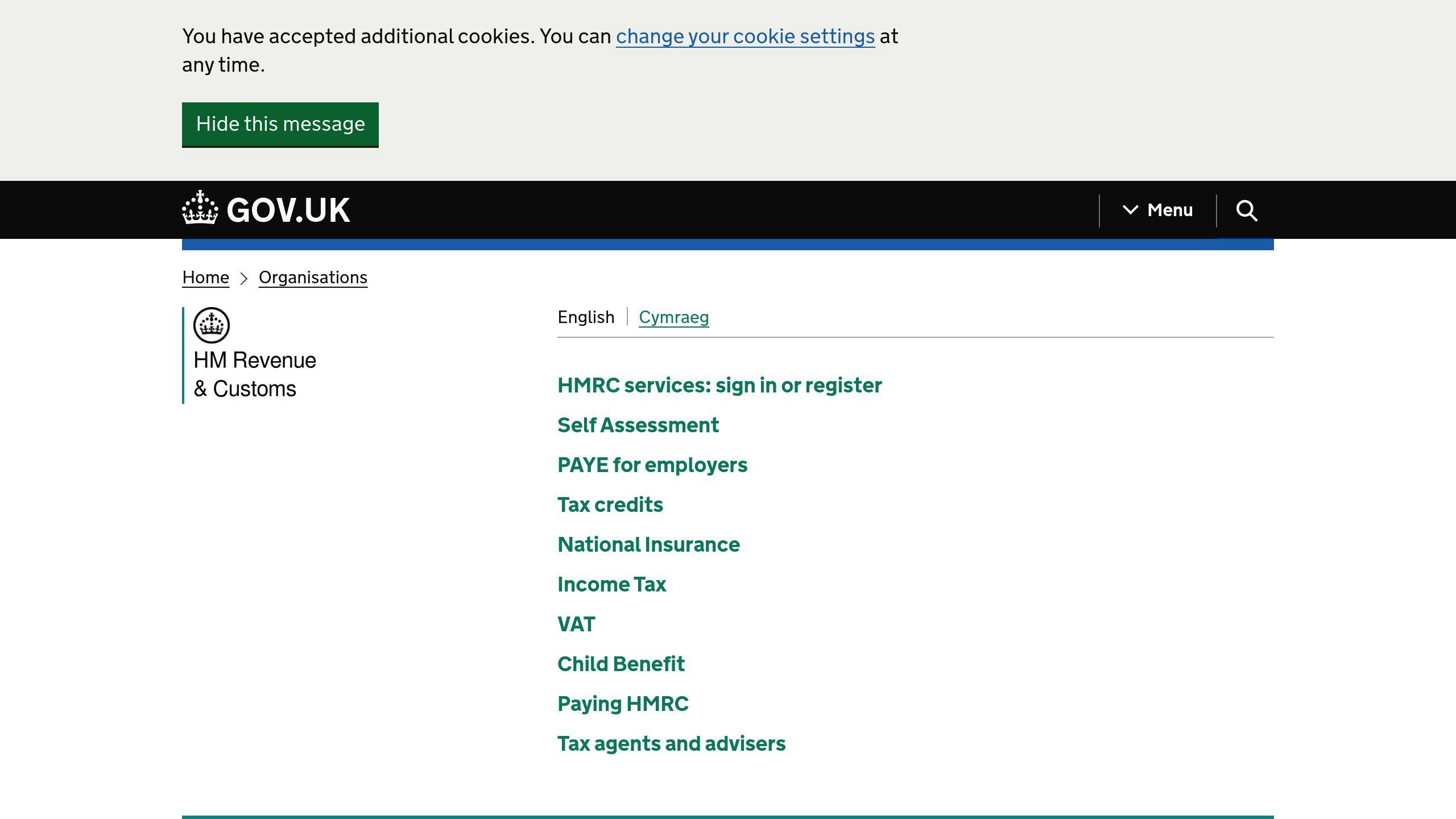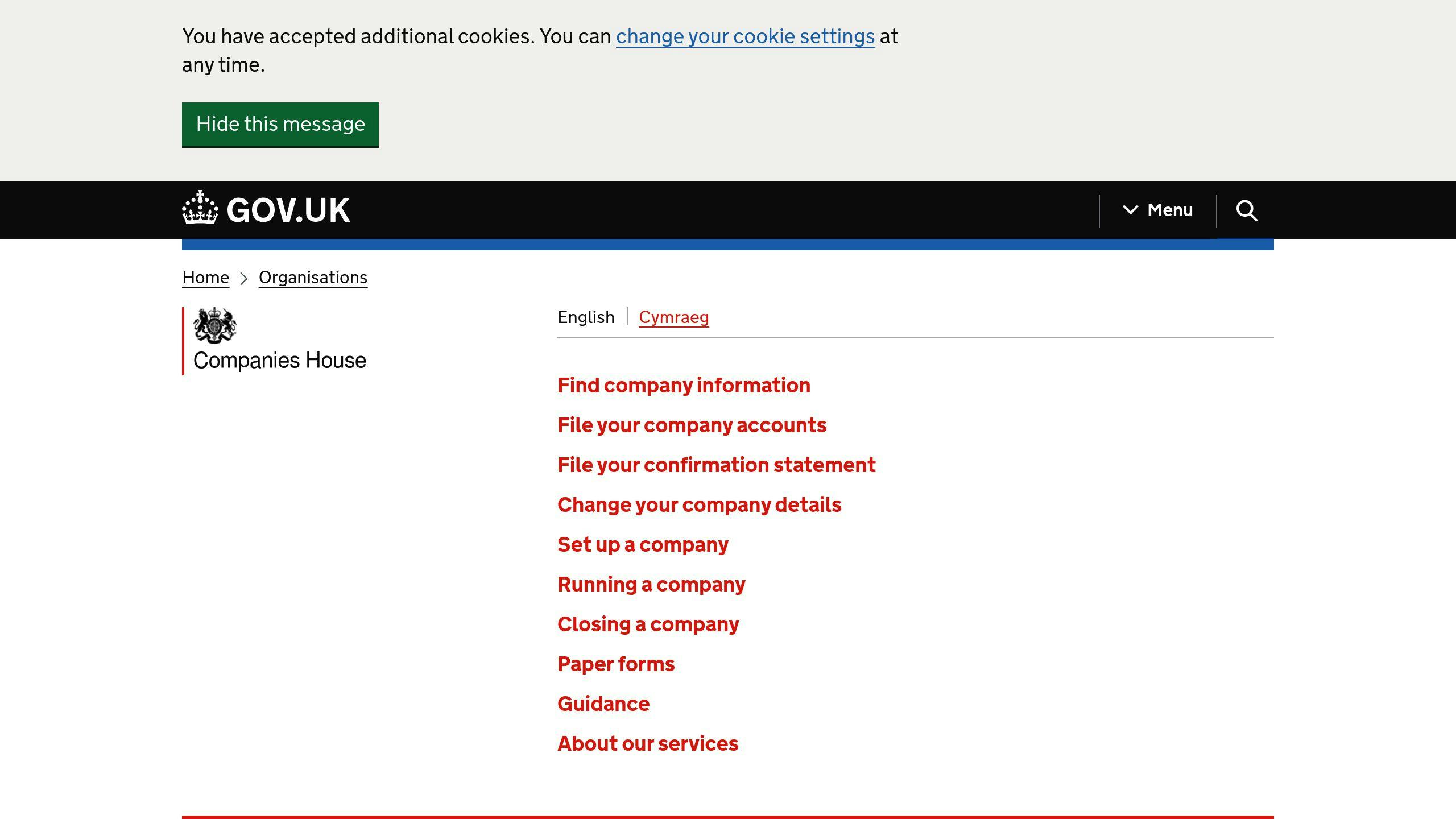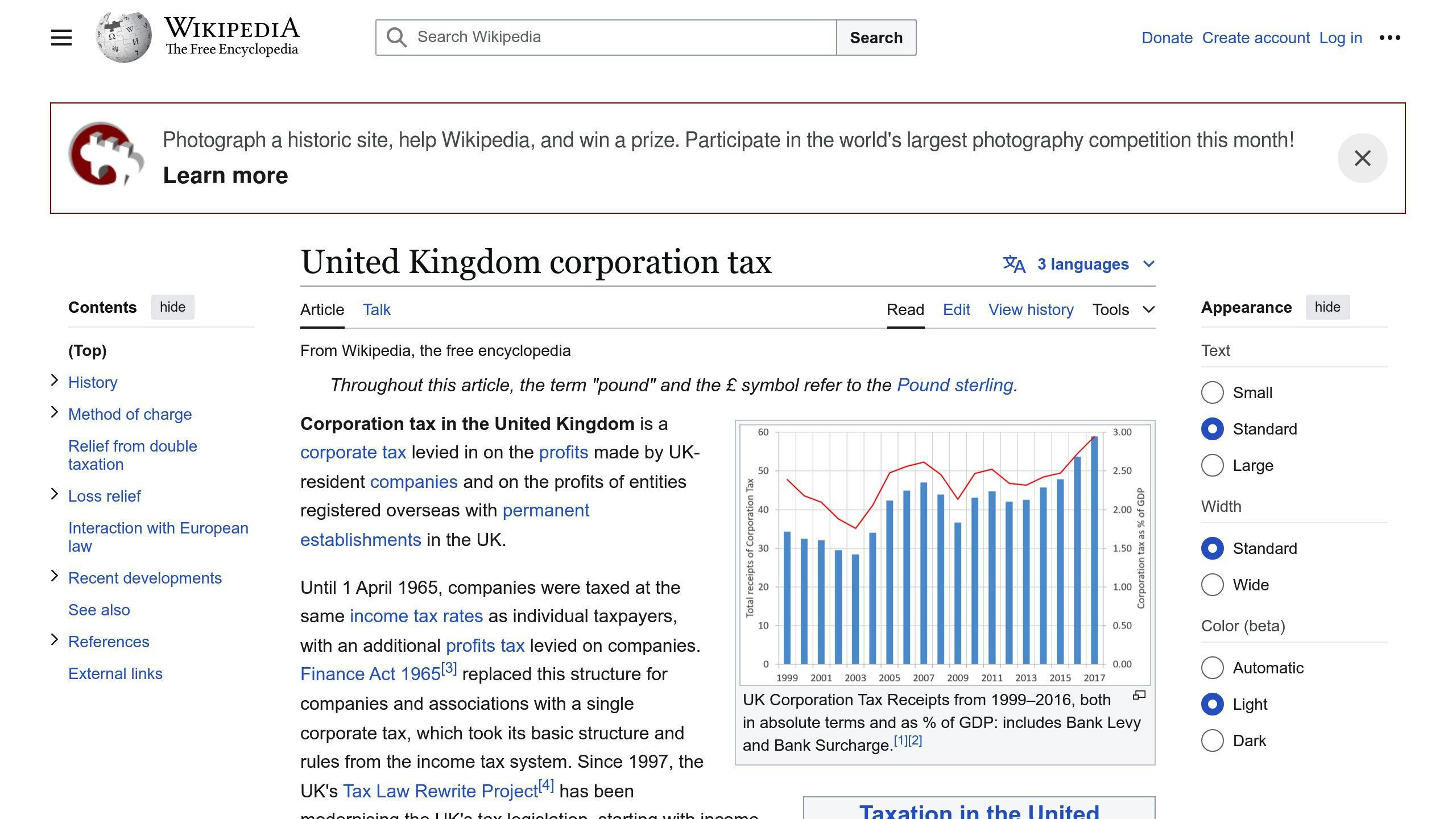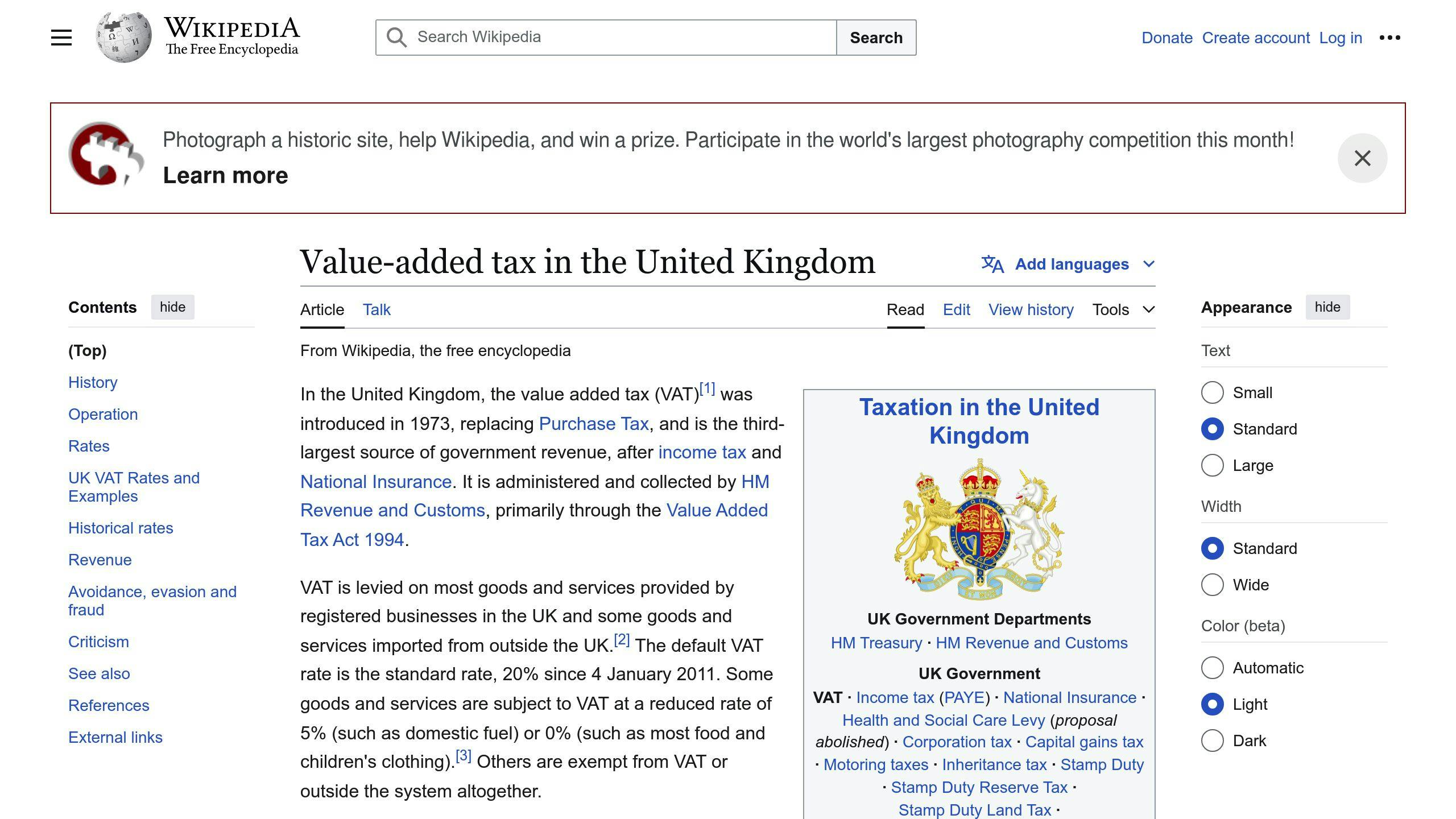A dormant company in the UK is a registered business that's not actively trading or making money. It's like a parked car - registered but not in use.
Key points:
- Registered with Companies House but not doing business
- No significant transactions or income
- Still has legal obligations
Why go dormant?
- Protect your company name
- Hold assets without trading
- Take a break from business
Legal duties:
- File annual confirmation statement
- Submit dormant accounts
- Tell HMRC you're dormant
Quick comparison:
| Aspect | Dormant Company | Active Company |
|---|---|---|
| Trading | No | Yes |
| Income | None | Yes |
| Tax Returns | Usually no | Yes |
| Annual Accounts | Simplified | Full |
| Confirmation Statement | Yes | Yes |
Remember: Small transactions can change your status. Stay on top of paperwork to avoid penalties.
Related video from YouTube
What is a dormant company?
A dormant company in the UK is a registered business that's not actively trading or making money. Think of it like a car parked in the garage - it's still registered, but nobody's driving it.
HMRC's take

HMRC says a company is dormant if it:
- Stopped trading and isn't earning
- Is a new limited company that hasn't started trading
- Is an unincorporated association or club owing less than £100 in Corporation Tax
- Is a flat management company
Here's the kicker: Dormant companies don't pay Corporation Tax or file Company Tax Returns unless HMRC asks for them.
Companies House view

Companies House sees things a bit differently. For them, a company is dormant if it has no "significant accounting transactions" during the accounting period.
What's significant? Here's a quick breakdown:
| OK | Not OK |
|---|---|
| Filing fees to Companies House | Buying and selling goods |
| Penalties for late filing | Renting property |
| Money paid for shares when starting | Advertising |
| Employing staff | |
| Earning interest |
Even if dormant, companies must:
1. File annual accounts (simpler than active companies)
2. Submit a yearly confirmation statement
Don't skip these filings. They're needed to stay dormant and avoid penalties.
As of March 2023, over 300,000 dormant companies were registered in the UK. That's a lot of parked cars!
Why companies become dormant
Companies go dormant for a few key reasons:
Protecting their name
It's all about brand protection. Imagine you're a freelancer called "Super Design Co." You might set up a dormant company with that name. Why? So no one else can snag it.
Holding onto assets
Dormant companies can own stuff without actually doing business. This comes in handy for:
- Property: Owning buildings or long-term leases
- Intellectual property: Keeping patents or trademarks safe
Think about a group of flat owners. They might use a dormant company to collectively own the building.
Taking a breather
Sometimes, businesses need to hit pause. Maybe it's because:
- Life happens (health issues, family stuff)
- The market's not great
- They're planning big changes
Take Sarah. She ran her marketing agency for a decade. But when her mom got sick, she made the company dormant. It gave her time to focus on family and figure out her next move.
Dormancy is like putting your business in hibernation. You're not actively trading, but you're not shutting down either. It's a way to keep your options open without the day-to-day hassle of running a company.
Legal duties
Dormant companies in the UK still have legal obligations. Here's what you need to know:
Yearly paperwork
Two key documents are required each year:
- Confirmation statement: Updates Companies House on basic company info.
- Dormant accounts: Shows the company had no significant transactions.
Don't skip these filings. Rachel Roberts from Companies House says:
"Some directors think that because HMRC may not require accounts from a dormant company, the same applies to Companies House. This is not the case."
Key dates:
- Confirmation statement: Due yearly, within 14 days of the review date
- Dormant accounts: Due 9 months after the financial year-end
Costs:
- Confirmation statement: £13 online
- Dormant accounts: Free
Dormant company accounts
Dormant accounts are simpler than active ones. They include:
- Company name and number
- Balance sheet date
- Statement of no significant transactions
- Director's signature
How to file:
- Use form AA02 from the Companies House website
- Fill in the details
- Submit online or by post
Note: Small transactions can change your company's status. These don't count:
- Paying Companies House filing fees
- Late filing penalties
- Money paid for shares when setting up the company
What dormant companies can do
Dormant companies in the UK can do a few things without losing their status. Here's what's allowed:
Small transactions
Dormant companies can handle some minor money stuff:
- Pay Companies House filing fees
- Pay late filing penalties
- Get money for shares from first shareholders
These don't count as real accounting activities.
Money limits
To stay dormant, companies must follow strict rules:
| OK | NOT OK |
|---|---|
| Pay to set up the company | Do any trading |
| Pay legal/professional fees | Earn interest |
| Keep a registered office | Manage investments |
| Own stuff (like property, IP) | Pay salaries |
| Give out dividends |
Important: Don't use a business bank account. UK tax advisor Emma Thompson says:
"Dormant companies should handle small expenses through personal accounts. This stops accidental transactions that could mess up dormant status."
Keep in mind:
- Close any business accounts if you were active before
- Don't hire staff or pay directors
- Don't buy, sell, or rent property
Tax rules
Dormant UK companies have tax obligations, even without active trading. Here's what you need to know:
Corporation Tax

Dormant companies don't pay Corporation Tax, but they must:
- Tell HMRC they're dormant
- Give their name, UTR, and when trading stopped
- Only file Company Tax Returns if HMRC asks
You can inform HMRC online, by phone, or mail. Tax advisers can use an agent code.
VAT rules

VAT is simple for dormant companies:
| VAT Status | What to Do |
|---|---|
| Not VAT registered | Nothing |
| VAT registered | Think about cancelling |
If you were VAT registered, it's usually best to cancel. This stops accidental VAT charges that could affect dormant status.
Key point: Dormant companies still file with Companies House:
- Annual confirmation statement
- Simplified dormant company accounts
"Dormant companies don't file tax returns with HMRC, but must file the annual confirmation statement and accounts with Companies House", says an HMRC spokesperson.
Note: HMRC and Companies House define "dormant" differently. HMRC looks at trading and income, Companies House at significant accounting transactions.
sbb-itb-74c344a
Waking up a dormant company
Ready to revive your dormant UK company? Here's what you need to do:
Starting to trade
1. Tell HMRC you're active
Let HMRC know within 3 months of restarting trade or getting income. Use HMRC Online Services to register for Corporation Tax.
2. Update Companies House
File your next annual accounts as an active company. This shows you're no longer dormant.
3. Create financial statements
Make full financial statements for your new trading activities. Send these to Companies House within 9 months of your year-end.
4. Pay Corporation Tax
If you owe it, pay Corporation Tax within 9 months and 1 day of your year-end.
5. File Company Tax Return
Send your Company Tax Return to HMRC within 12 months of your year-end. Include your statutory accounts.
| Task | When to do it |
|---|---|
| Tell HMRC | 3 months after restarting |
| Send accounts to Companies House | 9 months after year-end |
| Pay Corporation Tax | 9 months and 1 day after year-end |
| File Company Tax Return | 12 months after year-end |
Keep your accounting reference date the same with Companies House. It makes reporting easier.
Here's an example:
Your dormant company's accounting date is September 30. You restart on May 1. You'll need to:
- Make accounts for October 1 to September 30
- Send these to Companies House
- File a Tax Return for May 1 to September 30 with HMRC
Don't forget to:
- Reactivate or open bank accounts
- Re-register for VAT if needed
- Restart PAYE if you're hiring
"When the company starts trading again you will need to advise HMRC, or your accountant will, and I agree with the above to change the year end if it starts trading again before 31 Jan." - Anonymous Contributor
Common mistakes
People often confuse dormant companies with non-trading companies in the UK. This mix-up can cause big problems.
Not the same as non-trading
Dormant and non-trading companies are different:
| Dormant Company | Non-Trading Company |
|---|---|
| No significant transactions | May have some transactions |
| No income or expenses | Can have investment income or sales |
| Doesn't need to file tax return | Must file company tax return |
| Files dormant accounts | Files full company accounts |
Here's what you need to know:
1. Activity level
Dormant companies do nothing. Non-trading companies might do a little.
2. Tax obligations
Dormant companies don't pay Corporation Tax. Non-trading companies might.
3. Reporting requirements
Both file with Companies House, but the paperwork is different.
Watch out for these errors:
- Using the wrong forms (it can cost you)
- Thinking small transactions don't matter (they do)
- Not telling HMRC when you start trading again (do it within 3 months)
Real-life example:
An HS2 contractor thought it was dormant. But a few bank transactions put that in doubt. It's easy to slip up!
"Some companies choose to go dormant. Maybe they've shelved a business idea or want to pause trading for a while." - Roger Eddowes, Business Godparent
Bottom line: Not sure about your company's status? Talk to an accountant. It's cheaper than messing up.
Pros and cons
Keeping a dormant company in the UK has its ups and downs. Let's break it down:
| Pros | Cons |
|---|---|
| Protect company name | Yearly paperwork |
| Less admin work | Limited activities |
| Easy to restart | Possible confusion |
| Cheaper than active trading | Potential brand damage |
| Keep business structure | Costs without income |
The good stuff:
-
Name protection: Nobody else can snag your business name. Big deal for sole traders building a brand.
-
Paperwork lite: Dormant companies = fewer forms to fill out.
-
Quick restart: Ready to trade again? Just tell HMRC within 3 months.
-
Save some cash: Often cheaper than staying active or closing and reopening later.
The not-so-good stuff:
-
Still some duties: You'll need to file a yearly confirmation statement and dormant accounts.
-
Hands tied: No big transactions allowed. Can be tricky to manage.
-
Mix-up risk: People might confuse your dormant status with a non-trading company. Different rules apply.
-
Brand worries: Long-term dormancy might make customers and partners raise an eyebrow.
-
Money out, none in: You'll have some costs to stay registered, but no cash coming in.
Real-world example:
The M Group Holdings case shows how dormant status can impact taxes. If they'd kept their subsidiary dormant for over a year before selling shares, they might've dodged a £10 million tax bill.
"Keep at least two group companies, even if one's dormant. It can help sidestep potential tax headaches." - Tax expert on the M Group Holdings case
Quick facts:
- Over 500,000 dormant companies are on the UK's Companies House books.
- No time limit on dormancy.
- Late filing fines for dormant accounts start at £150, can hit £5,000 for directors.
Bottom line: Think it through. Not sure? Chat with an accountant about your situation.
Common questions
Let's tackle some frequent questions about dormant companies in the UK:
Can dormant companies have bank accounts?
Yes, they can. But there are rules:
- No big transactions
- No interest or fees
- No business activities
If you need to cover small costs, pay them yourself or through another company.
How long can a company stay dormant?
There's no time limit. A company can stay dormant forever if it:
- Files annual accounts and confirmation statements
- Avoids significant transactions
- Tells HMRC it's dormant
| Requirement | Companies House | HMRC |
|---|---|---|
| Annual accounts | ✓ | ✓ |
| Confirmation statement | ✓ | - |
| No significant transactions | ✓ | ✓ |
| No taxable income | - | ✓ |
Even if your company's dormant, you still have legal duties. Don't ignore them!
Some quick facts:
- Over 500,000 dormant companies are registered with Companies House
- Form AA02 (DCA) is for dormant company accounts
- Tell HMRC within 3 months if you start trading again
Dormant doesn't mean forgotten. Stay on top of paperwork to avoid penalties.
Wrap-up
Dormant companies in the UK aren't dead - they're just sleeping. Here's what you need to know:
A dormant company isn't doing business or making money. Both HMRC and Companies House have rules about this. Even when dormant, you still need to file some paperwork:
| What to Do | Companies House | HMRC |
|---|---|---|
| Annual accounts | Yes | Yes |
| Confirmation statement | Yes | No |
| No big transactions | Yes | Yes |
| Tell them you're dormant | No | Yes |
Why go dormant? Maybe you want to:
- Keep your company name
- Hold onto stuff you own
- Take a break from business
But watch out! Small slip-ups can wake your company up. Using a company bank account or earning interest? That could change your status.
To stay dormant:
- Pay small costs yourself or through another company
- Don't open a business bank account
- Keep good records
Ready to start up again? Tell HMRC within 3 months. You'll need to deal with taxes again.
Dormant companies have it easier, but they're not off the hook. Follow the rules to avoid fines and keep your options open.
FAQs
What's a dormant company in the UK?
A dormant company in the UK is a business that exists on paper but isn't doing anything. It's registered with Companies House but doesn't trade or make money. Think of it as a company taking a nap.
How long can a UK company stay dormant?
There's no time limit. A company can be dormant for as long as it wants - a few months, years, or even forever. Just remember to keep filing the required paperwork with Companies House and HMRC.
Do dormant companies need financial statements?
Most don't. If you're a private dormant company with less than £500,000 in assets, you're off the hook. But ALL dormant companies must file an annual confirmation statement with Companies House. It's like a quick check-in to say, "Yep, we're still here!"
What makes a company "dormant" in the UK?
A UK company is dormant if it:
- Is registered with Companies House
- Isn't doing any business
- Isn't making money (not even from investments)
Even though these companies are snoozing, they still have some paperwork to do. It's like having to send a postcard while on vacation.
Here's a quick look at what dormant companies need to file:
| What to File | Companies House | HMRC |
|---|---|---|
| Annual accounts | Yes (simple version) | No |
| Confirmation statement | Yes | No |
| Corporation Tax return | No | Only if previously active |
